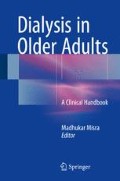Abstract
Advances in medicine have helped fight disease allowing people to live longer, albeit with a myriad of chronic medical conditions. There is no universally accepted definition of “elderly, old, or older” person, but the generally accepted age range for this cohort is over 65 years. Those over the age of 80 years are considered “very-elderly.”
Access this chapter
Tax calculation will be finalised at checkout
Purchases are for personal use only
References
U S Renal Data System (2012) USRDS 2012 annual data report: atlas of chronic kidney disease and end-stage renal disease in the United States. National Institutes of Health, National Institute of Diabetes and Digestive and Kidney Diseases, Bethesda
Kurella M et al (2007) Octogenarians and nonagenarians starting dialysis in the United States. Ann Intern Med 146(3):177–183
Mendelssohn DC, Malmberg C, Hamandi B (2009) An integrated review of “unplanned” dialysis initiation: reframing the terminology to “suboptimal” initiation. BMC Nephrol 10:22
Mendelssohn DC et al (2011) Suboptimal initiation of dialysis with and without early referral to a nephrologist. Nephrol Dial Transplant 26(9):2959–2965
Buck J et al (2007) Why do patients known to renal services still undergo urgent dialysis initiation? A cross-sectional survey. Nephrol Dial Transplant 22(11):3240–3245
Hughes SA et al (2013) Factors associated with suboptimal initiation of dialysis despite early nephrologist referral. Nephrol Dial Transplant 28(2):392–397
Metcalfe W et al (2000) Can we improve early mortality in patients receiving renal replacement therapy? Kidney Int 57(6):2539–2545
Foote C et al (2012) Survival of elderly dialysis patients is predicted by both patient and practice characteristics. Nephrol Dial Transplant 27(9):3581–3587
Gorriz JL et al (2002) Prognostic significance of programmed dialysis in patients who initiate renal substitutive treatment. Multicenter study in Spain. Nefrologia 22(1):49–59
Couchoud C et al (2007) Associations between comorbidities, treatment choice and outcome in the elderly with end-stage renal disease. Nephrol Dial Transplant 22(11):3246–3254
Information, C.I.f.H (2008) The cost of hospital stays: why costs vary. CIHI, Ottawa
Caskey FJ et al (2003) Early referral and planned initiation of dialysis: what impact on quality of life? Nephrol Dial Transplant 18(7):1330–1338
Loos C et al (2003) Effect of end-stage renal disease on the quality of life of older patients. J Am Geriatr Soc 51(2):229–233
Group., K.D.I.G.O.K.C.W (2013) KDIGO 2012 clinical practice guideline for the evaluation and management of chronic kidney disease. Kidney Int Suppl 3(1):1–150
Curtis BM et al (2005) The short- and long-term impact of multi-disciplinary clinics in addition to standard nephrology care on patient outcomes. Nephrol Dial Transplant 20(1):147–154
Goldstein M et al (2004) Multidisciplinary predialysis care and morbidity and mortality of patients on dialysis. Am J Kidney Dis 44(4):706–714
Rioux JP et al (2011) Effect of an in-hospital chronic kidney disease education program among patients with unplanned urgent-start dialysis. Clin J Am Soc Nephrol 6(4):799–804
Hanko J et al (2011) Dedication of a nurse to educating suboptimal haemodialysis starts improved transition to independent modalities of renal replacement therapy. Nephrol Dial Transplant 26(7):2302–2308
Saggi SJ et al (2012) Considerations in the optimal preparation of patients for dialysis. Nat Rev Nephrol 8(7):381–389
Davison SN (2006) Facilitating advance care planning for patients with end-stage renal disease: the patient perspective. Clin J Am Soc Nephrol 1(5):1023–1028
Holley JL (2005) Palliative care in end-stage renal disease: focus on advance care planning, hospice referral, and bereavement. Semin Dial 18(2):154–156
Kurella Tamura M, Cohen LM (2010) Should there be an expanded role for palliative care in end-stage renal disease? Curr Opin Nephrol Hypertens 19(6):556–560
Author information
Authors and Affiliations
Corresponding author
Editor information
Editors and Affiliations
Rights and permissions
Copyright information
© 2016 Springer Science+Business Media New York
About this chapter
Cite this chapter
Yerram, P. (2016). Unplanned Start of Hemodialysis and Transition to Community. In: Misra, M. (eds) Dialysis in Older Adults. Springer, New York, NY. https://doi.org/10.1007/978-1-4939-3320-4_15
Download citation
DOI: https://doi.org/10.1007/978-1-4939-3320-4_15
Published:
Publisher Name: Springer, New York, NY
Print ISBN: 978-1-4939-3318-1
Online ISBN: 978-1-4939-3320-4
eBook Packages: MedicineMedicine (R0)

